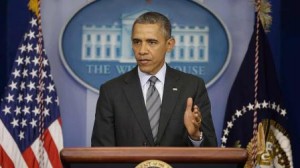Special to WorldTribune.com
LONDON — The Gulf Cooperation Council has seen the U.S. handling of
Russia’s invasion of Ukraine as evidence of President Barack Obama’s
weakness, a leading analyst said.
[See also: Breaking bad: Qatar splits with Gulf neighbors over Iran in blow to U.S. strategy]

Riad Kahwaji, chief executive officer of the Institute for Near East and Gulf Military Analysis, asserted that the tepid U.S. response to the Russian seizure of Ukraine’s Crimea reinforced the GCC image of a declining America.
Kahwaji, regarded as close to the GCC leadership, said the crisis in Ukraine lowered expectations of Obama’s visit to Saudi Arabia on March 22.
“The wide growing perception in the Middle East region, as well as other parts of the world, is that the United States appears to be a fading power incapable of protecting the interests of its allies and unable to stand up to bold challenges,” Kahwaji said.
“The ongoing situation in Ukraine could not have come at a worse time for Washington because it has only reinforced the perception of a weak America on the retreat.”
In an analysis for the consultant Eurasia, Kahwaji cited GCC, and
particularly Saudi concerns, over Obama’s rapproachment with Iran as well as
his refusal to support Sunni rebels in Syria. The analysis also said the GCC
was alarmed by U.S. military help to Iraq as it battles a Sunni revolt in
Anbar.
“Most Arab Gulf states share the sentiments of the Iraqi Sunni tribes in
the Anbar province,” the analysis, titled “Crucial Obama Visit To Saudi
Arabia Requires Decisive Action,” said.
Kahwaji, who organizes security conferences around the Middle East, said
the GCC was also dismayed by U.S. support for the Muslim Brotherhood in
Egypt. He said most of the six GCC states were no longer sure whether was
Washington was reliable.
“In short, Saudi Arabia and other Gulf states have become intolerant to
any steps or policies that they see as threatening to their stability that
might contribute to empowering Iran and the Muslim Brotherhood in the
region,” Kahwaji said.
The analysis envisioned a difficult session between Obama and the Saudi
leadership. Kahwaji said the Saudi leadership would demand practical steps
by the United States to demonstrate its support for Arab allies.
“President Obama should not expect any easy discussions or soft polite
words when he meets soon with Saudi and other Gulf officials,” the analysis
said. “He will be expected to present clear, solid and sellable policies
that would produce short-term tangible results. Yet, it is not clear whether
talk and promises would be enough to reverse the perception Saudi and many
Gulf officials have of Obama and America today.”

You must be logged in to post a comment Login